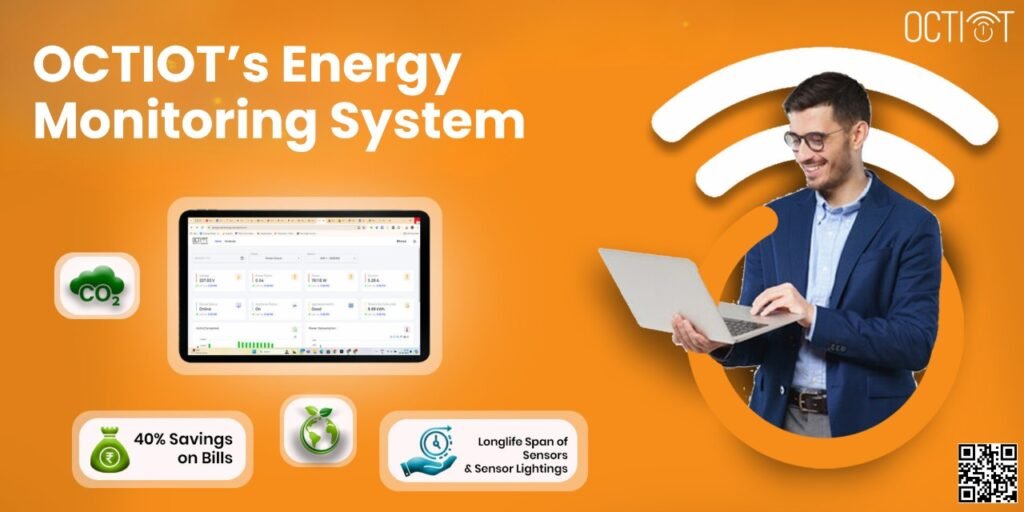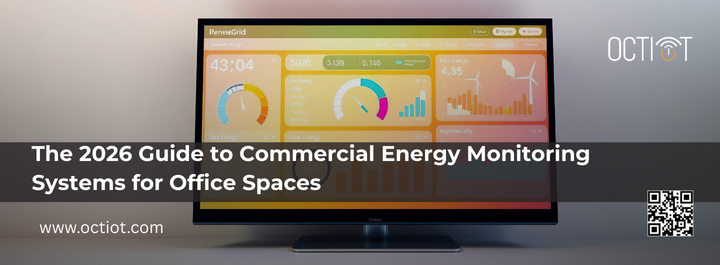Introduction
In today’s rapidly evolving business landscape, sustainability is not just a buzzword—it’s a crucial part of any company’s strategy. Businesses are increasingly being held accountable for their environmental, social, and governance (ESG) performance. ESG compliance, which refers to a company’s adherence to standards that promote ethical business practices, environmental responsibility, and robust governance, has become a key factor in long-term success.
One of the most pressing aspects of ESG compliance is energy efficiency. With growing concerns over climate change, regulatory pressure, and a demand for transparency from consumers, businesses are looking for innovative ways to reduce their environmental footprint. OCTIOT’s Energy Monitoring System (EMS) offers a solution that not only helps businesses optimize their energy consumption but also empowers them to meet their ESG goals, driving both sustainability and operational efficiency.
Understanding ESG Compliance
What is ESG Compliance?
ESG compliance refers to a company’s adherence to specific standards that ensure responsible environmental, social, and governance practices. While the focus of ESG may vary from one organization to another, companies are increasingly expected to integrate sustainable practices into their operations. ESG compliance involves aligning with global sustainability initiatives, meeting regulatory standards, and demonstrating a commitment to the broader community.
Key ESG Metrics Related to Energy Consumption and Sustainability
For businesses to meet ESG compliance, energy efficiency is a key performance metric. Companies are evaluated based on how efficiently they use energy, manage resources, and reduce their carbon footprint. Some common metrics include:
- Carbon Emissions: How much greenhouse gas (GHG) emissions a business produces through its energy use and operations.
- Energy Intensity: The amount of energy consumed per unit of output, such as per product produced or per square meter of building space.
- Renewable Energy Usage: The percentage of energy sourced from renewable sources.
- Resource Efficiency: How effectively a company uses energy and resources in its operations.
Regulatory Frameworks and Industry Standards Driving ESG Adoption
Across industries, there are growing calls for businesses to adopt practices that align with ESG principles. Global initiatives like the Paris Agreement and the United Nations Sustainable Development Goals (SDGs) are pushing for measurable action on climate change. Regulations, such as the EU Green Deal and the U.S. Clean Energy Standard, aim to ensure businesses reduce their environmental impact. As these frameworks evolve, companies that fail to comply with ESG standards may face fines, loss of investor confidence, and a tarnished reputation.

The Role of Energy Monitoring in ESG Compliance
How Energy Consumption Impacts Environmental Sustainability
Energy consumption plays a significant role in environmental sustainability. Industries, commercial buildings, and retail chains consume vast amounts of energy, contributing significantly to carbon emissions. By tracking and optimizing energy usage, businesses can reduce their environmental impact, lower costs, and improve their ESG scores.
The Significance of Real-Time Energy Tracking for Carbon Footprint Reduction
Real-time energy monitoring is an essential tool in reducing a company’s carbon footprint. The ability to track energy usage in real-time allows businesses to identify inefficiencies, waste, and opportunities for improvement. By optimizing energy consumption through smart systems, companies can directly lower their carbon emissions and improve their sustainability performance.
The Necessity of Data-Driven Decision-Making for ESG Reporting
Accurate data is vital for ESG reporting. Companies need to provide stakeholders—investors, regulators, and customers—with concrete evidence of their sustainability efforts. Data-driven insights allow for better decision-making, enabling businesses to create actionable plans that reduce their energy consumption, lower emissions, and contribute to a more sustainable future.
How OCTIOT’s Energy Monitoring System Helps Businesses

Meet ESG Goals
OCTIOT’s Energy Monitoring System (EMS) is designed to help businesses stay ahead of energy consumption trends, improve efficiency, and meet sustainability goals. Below are some of how the EMS contributes to achieving ESG compliance:
Real-Time Energy Consumption Tracking
The OCTIOT EMS allows businesses to monitor energy consumption in real-time. This feature helps organizations track usage patterns, detect inefficiencies, and optimize operations. Real-time monitoring ensures that businesses can take immediate action to reduce energy waste, adjust systems accordingly, and make informed decisions to conserve energy.
Automated Reports for ESG Audits
Generating accurate, reliable data for ESG audits is critical for businesses aiming to maintain compliance. OCTIOT’s EMS automates the process of energy data collection, producing detailed reports that simplify the preparation of ESG disclosures. These reports are essential for businesses to present their sustainability efforts to regulators, investors, and other stakeholders.
Integration with Smart Lighting and HVAC Systems
The integration of OCTIOT’s EMS with smart lighting and HVAC systems allows businesses to maximize energy savings. By controlling and optimizing these systems based on real-time data, businesses can ensure that they are using energy efficiently, reducing waste, and lowering their carbon footprint. For example, lights and HVAC units can be programmed to operate only when necessary, minimizing energy consumption and improving overall efficiency.
Carbon Footprint Reduction
By providing businesses with detailed energy usage data, the EMS enables companies to understand their energy consumption patterns and take proactive steps to reduce emissions. Through continuous monitoring and optimization, businesses can lower their carbon footprint, contributing to the fight against climate change.
Industry Use Cases of OCTIOT’s EMS in ESG Compliance
OCTIOT’s EMS is adaptable to a variety of industries, enabling organizations across sectors to meet ESG standards. Below are a few use cases:
Manufacturing Industries
Manufacturing industries are major energy consumers, and by implementing OCTIOT’s EMS, companies can monitor and optimize their energy usage, reduce operational costs, and minimize their environmental impact. With real-time tracking, manufacturers can adjust production schedules, optimize machine usage, and reduce energy waste, ensuring compliance with sustainability regulations.
Commercial Buildings & Offices
Commercial buildings and office spaces are responsible for significant energy usage, particularly in heating, ventilation, and air conditioning (HVAC) systems and lighting. OCTIOT’s EMS can help these buildings monitor and optimize energy consumption, ensuring that they meet ESG targets related to energy efficiency and sustainability.
Smart Cities
Smart cities rely on efficient infrastructure to manage resources like electricity, water, and transportation. OCTIOT’s EMS enables municipalities to monitor energy usage across public infrastructure, such as street lighting and traffic management systems, ensuring that these systems are efficient and sustainable, and contribute to overall ESG compliance.
Retail Chains & Warehouses
Retail chains and warehouses often operate large-scale facilities with high energy demands. By integrating OCTIOT’s EMS, businesses can track and manage energy consumption across multiple locations, identifying areas where energy can be saved, reducing costs, and ensuring that they remain compliant with ESG regulations.
The Financial and Brand Benefits of ESG Compliance
Achieving ESG compliance through energy efficiency offers several tangible benefits for businesses:
Cost Savings from Reduced Energy Consumption
By optimizing energy usage and reducing wastage, businesses can significantly cut operational costs. These savings can be reinvested into other sustainable initiatives or used to improve profitability.
Improved Brand Reputation and Investor Appeal
Businesses that demonstrate a commitment to sustainability and ESG compliance often enjoy improved brand reputation and increased appeal to investors. A strong ESG performance can help businesses differentiate themselves in the marketplace, attract environmentally conscious consumers, and improve stakeholder relations.
Compliance with Global Sustainability Regulations and Government Incentives
Companies that meet ESG compliance are better positioned to navigate regulatory frameworks and may be eligible for government incentives, such as tax breaks or grants. In many countries, businesses that implement sustainable practices are rewarded with financial support and favourable policies.
Conclusion
OCTIOT’s Energy Monitoring System provides businesses with the tools they need to reduce energy consumption, lower carbon emissions, and achieve ESG compliance. By offering real-time energy tracking, automated reports, and integration with smart systems, the EMS enables businesses to make data-driven decisions that align with sustainability goals.
As the demand for sustainability continues to grow, businesses that integrate OCTIOT’s EMS into their operations will not only improve their ESG performance but also position themselves for long-term success. Now is the time to take action—embrace OCTIOT’s Energy Monitoring System for a sustainable future.




